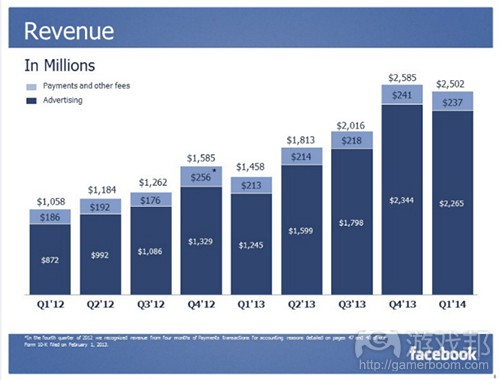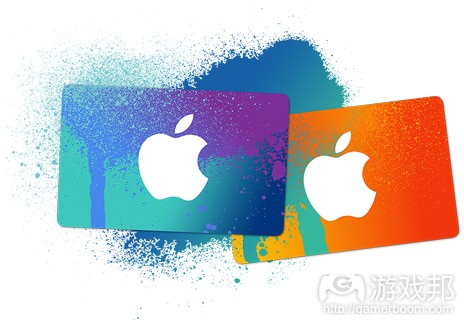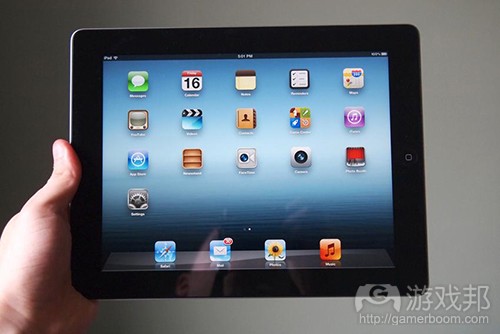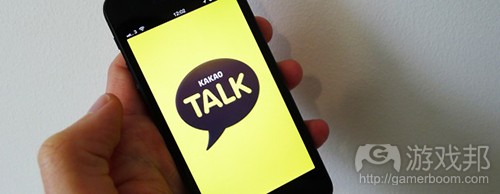每日观察:关注中美韩玩家发现游戏的渠道(4.24)
1)据gamasutra报道,Facebook日前宣布其游戏收益在上个季度仍然强劲,但预计未来发展将出现困难,因为大量Facebook用户已从桌面平台转向移动平台,而Facebook目前主要游戏支付收益却是来自桌面平台。
Facebook“整体支付及其他费用”收益是Facebook游戏的主要收益来源,在2014年第一季度(截止3月31日)达到2.37亿美元,同比去年第一季度增长10%,但其中主要增长却并非来自游戏业务。
Facebook首席财务官David Ebersman表示第一季度Facebook游戏支付收益同比上年仅增长1%,远低去2013年时Facebook报告所显示的8%年增长率,可见Facebook游戏支付收益增长将随着用户转向移动平台而逐渐下降。
Facebook在第一季度的主要收益来自广告业务(22.65亿美元),该时期Facebook整体收益为25亿美元,利润达10.8亿美元。
2)据gamasutra报道,Zynga日前宣布创始人Mark Pincus(其CEO一职已被EA和微软元老Don Mattrick所取代)放弃首席产品官的职位,并退出公司的日常运营事务,但仍将是公司董事会主席。
除此之外,现任首席执行官Don Mattrick还指派微软元老Alex Garden担任Zynga工作室总裁,Garden之前是Xbox Live和Xbox音乐、视频和阅读总经理,现在将负责监管Zynga游戏开发工作室的业务。他还是Relic Entertainment联合创始人,并且曾经是Nexon北美公司首席执行官。
Mattrick还任命好莱坞元老Henry LaBounta为首席视觉官,Jennifer Nuckles为首席营销官。
Zynga今年第一季度日活跃用户已从去年同期时的5200万降至2800万,月活跃用户则从原来的2.53亿缩水为1.23亿。
该公司收益降为1.68亿美元,同比去年下降36%,第一季度净亏损为6100万美元;但旗下三大游戏仍然与去年相同,分别为《FarmVille 2》、《Zynga Poker》以及《FarmVille》。
3)据venturebeat报道,苹果首席执行官Tim Cook日前宣布iTunes用户帐号已将近8亿,苹果用户上个季度在iTunes投入为52亿美元(上一季度为47亿美元),比去年同期增长24%。
苹果App Store应用下载量已达700亿次,超过了今年1月份时的650亿次。
苹果iTunes目前绑定了4亿张以上的信用卡,这是苹果的一项重新资产,有传言称苹果可能会在移动支付系统上发力。
苹果在本季度收益为456亿美元,利润达102亿美元,去年同期时收益为436亿美元,净利润为95亿美元。
4)据venturebeat报道,苹果在日前财报中宣布iPad在其2014财年第二季度销量为1635万台,低于分析师所预期的1920万至1970万台。
苹果认为iPad销量下降主要归结于库存差异,苹果去年同期将1800万台左右的iPad推向零售平台,实际销量却达到1950万台;而在上个季度苹果向零售终端推出了1750万台iPad,但实际销量仅为1635万台(也就是还有110万台未销售的存货)。
而观察者认为,就算不考虑库存问题,iPad销量下降约16%也是个不争的事实。但Tim Cook则将此归因于iPad的快速普及,他指出苹果发布首款iPad的这四年以来,该设备销量就已超过2.1亿台;同一时期iPad销量几乎是iPhone的两倍,iPad销量还是iPod销量的7倍以上。
5)据gamasutra报道,Unity Technologies日前宣布在莫斯科成立新工作室,以便为俄罗斯开发者提供更多支持。
Unity称使用Unity工具的俄罗斯开发者和发行商大量崛起,他们将通过这个新工作室帮助促进整个俄罗斯游戏行业的发展。Unity目前工作室已遍布旧金山、加拿大、中国、哥伦比亚、丹麦、芬兰、德国、日本、韩国、立陶宛、俄罗斯、新加坡、瑞典、包克兰和英国。
6)inMobi最近报告分析了不同市场的玩家喜好和消费习惯,并指出中国和韩国玩家更喜欢RPG/冒险游戏,而美国人更喜欢谜题游戏。开发者应该考虑不同市场的用户特点来设计盈利方案。
美国人、中国人和韩国人都喜欢下载免费游戏,但他们发现应用的习惯却大不相同。
美国人发现应用的两大渠道是检索应用商店,以及口头推荐。三分之一美国人是通过移动广告或其他应用、网站发现游戏应用,四分之一美国受访者则是通过社交媒体发现游戏。中国iOS游戏玩家主要通过检索应用商店发现游戏。但仅有三分之一的中国Android玩家通过应用商店检索应用,他们主要通过手机应用和网站评价、推荐来发现应用。
有趣的是,许多韩国人是通过Kakao游戏平台发现游戏,该国Google Play和App Store前十大畅销游戏中有9款均是针对Kakao平台打造的游戏。
中国玩家每月所玩的游戏数量最多,他们的下载意愿也最高,预计在未来30天中会下载7.5款游戏,比美国和韩国玩家的下载意愿高20%。
但中国玩家体验免费应用的意愿比美国人高31%,而后者混合体验免费与付费应用的意愿则比中国玩家高36%。(本文为游戏邦/gamerboom.com编译,拒绝任何不保留版权的转载,如需转载请联系:游戏邦)
1)Facebook game revenue growth falters as users move to mobile
By Alex Wawro
Facebook game revenue remained strong through the past quarter, the company said today, though it expects that further growth will be difficult as Facebook users move from accessing the service on desktop — where all game payment revenue is currently generated — to accessing it via mobile devices.
The company’s “total payment and other fees” revenue — which is made up largely of revenue from Facebook games — was $237 million for the first quarter of 2014, which ended on March 31.
That’s just over 10 percent more than the $213 million in payment revenue Facebook reported for the first quarter of last year, but most of that growth didn’t come from games.
During an earnings call with shareholders today, Facebook’s outgoing CFO David Ebersman said that revenue generated specifically by Facebook game payments in the first quarter of 2014 grew just one percent year-over-year.
That’s significantly less than the 8 percent year-over-year growth in revenue from games that Facebook reported at the end of 2013, and it suggests that growth in payment revenue from Facebook games will continue to slow going forward as more people access Facebook on their tablets and phones.
“The shift to mobile is a significant headwind, since our games payments revenue comes from desktop only, where usage is flattened or declining,” said Ebersman during today’s earnings call. “Growing this [games payment] business going forward will be challenging.”
Facebook continues to talk up its efforts to transition to mobile in order to adapt to a declining desktop user base, but most of that talk is focused on improving its advertising business, where Facebook makes the lion’s share of its money.
To that end, the company posted big numbers for the first quarter of 2014, with $1.08 billion in profits and revenue of $2.5 billion.(source:gamasutra)
2)Zynga founder Mark Pincus steps down as company poaches Xbox Live point-man
By Christian Nutt
Less than a year ago, an embattled Zynga named Don Mattrick as its CEO. Mattrick, an EA veteran, came from Microsoft, where he’d most recently headed up launch efforts for Xbox One.
Mattrick took over the Zynga role from company founder Mark Pincus, who’d been roundly criticized by investors, and soon announced a 90-day plan to reform the company. The 90 days may have elapsed, but those efforts are still ongoing.
Today, the company announced an even bigger change alongside its first quarter 2014 financial results: Pincus is stepping aside almost completely. He’s abandoning his chief product officer role and moving away from day-to-day operations for the company, though he will remain chairman of the board.
Further from that, Mattrick has appointed Microsoft colleague Alex Garden president of Zynga Studios. Garden was general manager for Xbox Live and Xbox Music, Video and Reading. Garden will now oversee all of Zynga’s game development studios. He’s also the co-founder of Relic Entertainment, and also had a stint as CEO of the North American division of Nexon — publishers of MMO MapleStory.
Mattrick hasn’t stopped there. The company has also added two more C-level executives, it has announced: Hollywood veteran Henry LaBounta (Minority Report, Twister) joins as chief visual officer, and Jennifer Nuckles comes on as chief marketing officer. Nuckles, the release notes, has an e-commerce background and experience marketing directly to women.
Don’t forget the numbers
Zynga is still in the midst of transformation, and its numbers for the quarter ended March 31 reflect that: Year-on-year, its daily active users are way down — 28 million, as compared to 52 million in the quarter a year ago. Monthly active users shrank from 253 million to 123 million in the comparable period.
Revenues decreased accordingly: They were down 36 percent year-on-year to $168 million. Of note, its biggest games haven’t changed: FarmVille 2, Zynga Poker, and FarmVille are the number one, two, and three earners, as they were a year ago.
This — alongside a hefty restructuring charge of $30 million as the company reshapes the way it does business, including jettisoning some data centers — led to a net loss of $61 million for the first quarter of 2014.(source:gamasutra)
3)Apple has ‘nearly’ 800 million iTunes accounts
Eric Blattberg
Apple CEO Tim Cook thinks the number of people using iTunes is “staggering.”
Apple has nearly 800 million iTunes accounts, Cook said during today’s quarterly earnings call. Apple customers spent $5.2 billion on iTunes purchases last quarter, 24 percent more than the same period a year ago. That’s also a significant jump from the $4.7 billion that Apple customers shelled out on apps, music, and movies the prior quarter.
The Cupertino, Calif.-based tech giant now measures 70 billion cumulative app downloads from its App Store, up from 65 billion in January.
Apple has more than 400 million credit cards on file just from iTunes, a Morgan Stanley executive told VentureBeat last week. This an important asset for Apple, as rumors suggest that it may be working on a mobile payment system.
Apple had a strong second quarter, beating analysts’ expectations. Apple reported $10.2 billion in profit on revenues of $45.6 billion for that period. These results compare to net profit of $9.5 billion on revenue of $43.6 billion from the same quarter last year. Get the full story here.(source:venturebeat)
4)Apple blames low Q2 iPad sales on inventory changes
Devindra Hardawar
The iPad’s sales are still declining, but Apple’s tablet may not be in as much trouble as some may think.
In its earnings report today, Apple revealed that it sold 16.35 million iPads during the second quarter. Analysts, meanwhile, expected sales between 19.2 million and 19.7 million devices.
Due to an inventory discrepancy, Apple claims its overall decline in sales to customers was only down around 3 percent from last year, when it sold 19.5 million iPads.
Apple’s corporate controller, Luca Maestri, explained during the earnings call today that the company pushed around 18 million iPads to retail last year (which means it sold off over a million iPads from stock it had previously). For this past quarter, Apple pushed 17.5 million to retail, but it only sold 16.35 million (which left 1.1 million in unsold inventory).
But without taking these inventory issues into account, iPad sales appear to have fallen around 16 percent. That’s the number most investors and analysts will point to when they predict doom for the iPad.
However you count the iPad’s decline, it’s easy to see that things are slowing down for Apple’s beloved tablet. And it seems even Apple CEO Tim Cook is aware of that — though he appears to attribute the decline more to the iPad’s fast adoption.
“iPad has absolutely been the fastest growing product in Apple’s history,” Cook said during the earnings call today. “It’s been the only product that we’ve ever made that was instantly a hit in three of our key markets — from consumers to business, including the enterprise, and education. … If you really look at it, in just four years since we launched the very first iPad we’ve sold more than 210 million, which was more than what we thought was possible in that period of time.”
Cook pointed out that Apple sold more than twice as many iPads than iPhones during the same period of time, and iPad sales were also seven-times greater than iPod sales during its first four years.(source:venturebeat)
5)New Unity offices in Moscow aim to support Russian devs
By Mike Rose
Newsbrief: As the number of Russian developers adopting the Unity Engine grows, Unity Technologies is looking to better support these devs. The company announced today that it has opened a new office in Moscow.
Unity says that it has seen “a dramatic increase in the number of developers and publishers using Unity in Russia,” and as such, this new office will look to boost the Russian games industry as a whole.
Unity now has offices in San Francisco, Canada, China, Colombia, Denmark, Finland, Germany, Japan, Korea, Lithuania, Russia, Singapore, Sweden, Ukraine, and the United Kingdom.(source:gamasutra)
6)Monetisation in different markets
This is an extract from a white paper by inMobi. Download the full white paper here
The first decision in a monetization strategy starts with understanding which types of games are popular in which regions. For example, Chinese and Korean gamers are far more likely to prefer RPG/adventure games while Americans prefer puzzle games. Developers must then consider how their demographic discovers games.
Americans, Chinese, and Koreans all prefer to download free apps, but how they discover apps differs widely. Developers must also consider how their desired demographic views and makes in-app purchases. Attitudes towards mobile purchases and the reasons users make these purchases are very different, and developers should create purchase experiences that appeal to the specific region they’re marketing. Developers should then utilize in-app advertising to increase revenue and monetize from players who are resistant to paying for downloads or making in-app purchases.
App Download Intent and Discovery
Let’s take a look at how each region downloads and discovers apps.
Chinese gamers play the most number of games per month. Through our study, we also discovered that Chinese gamers also have the highest download intent, expecting to download 7.5 games in the next 30 days – that’s more than 20% higher than American and Korean download intent.
Gamers of all three countries exhibit similar paid app download behaviors. About 56% of gamers play all free apps.
However, Chinese gamers are 31% more likely than American gamers to play mostly free applications, whereas American gamers are 36% more likely than Chinese gamers to play a healthy mix of both paid and free apps.
App Discovery
App discovery mechanisms vary by country. In the United States, browsing app stores and following word of mouth recommendations are the two most popular methods of app discovery. Although there are a few emerging app stores, such as Amazon and Window’s Phone stores, Apple’s iOS App Store and Google’s Play Store dominate the United States download market.
One-third of American survey respondents discover game applications via mobile advertisements or other mobile applications and sites, and one-quarter of American respondents discover games through social media. American gamers are not likely to discover apps by perusing online websites and ads or by reading magazines and newspapers.
China suffers from a very fragmented app distribution ecosystem. Although there are several sites that allow for the pirating of iOS games, similar to the U.S., China’s iOS store is still the primary store to download iOS apps in China. Our gaming study shows that two-thirds of Chinese iOS gamers discover apps by browsing the app stores. However, unlike the U.S., where Google Play monopolizes Android game downloads, China has an incredibly fragmented Android game distribution, with more than 500 competing app stores. According to our study, only one-third of Chinese Android gamers discover apps through app stores, and instead rely just as heavily on mobile apps and websites for reviews and recommendations.
Game distribution is more fragmented in Korea than in the U.S., but less so than in China. Android games reign supreme in Korea – Samsung and LG dominate the smartphone market, making iOS relatively obsolete. In fact, Korea generates the most revenue in the Google Play Store, second only to Japan12. Despite this, Google Play does not have a monopoly on the Korean Android app market. Smartphone companies, such as Samsung and local carriers like SK Telecom, also create and curate their own app stores.
More interestingly, many Koreans discover games through Kakao’s game platform. Kakao began as a mobile chat application that allowed users to make free calls or send free messages to other users. The chat application accrued more than 100 million users, and the company leveraged its application’s massive social network to create a mobile gaming platform. Using Kakao’s platform, players are able to invite their friends to download games, play games with their friends, and make in-app purchases, among other capabilities. Kakao’s business model has proven so successful that as of this publication, 9 of the top 10 grossing games on both Google Play and Apple Appstore games in Korea are games made for the Kakao platform9.
Following in Kakao’s footsteps, China’s Tencent is building a similar game platform model using its messaging application WeChat.(source:gamesbrief)













































